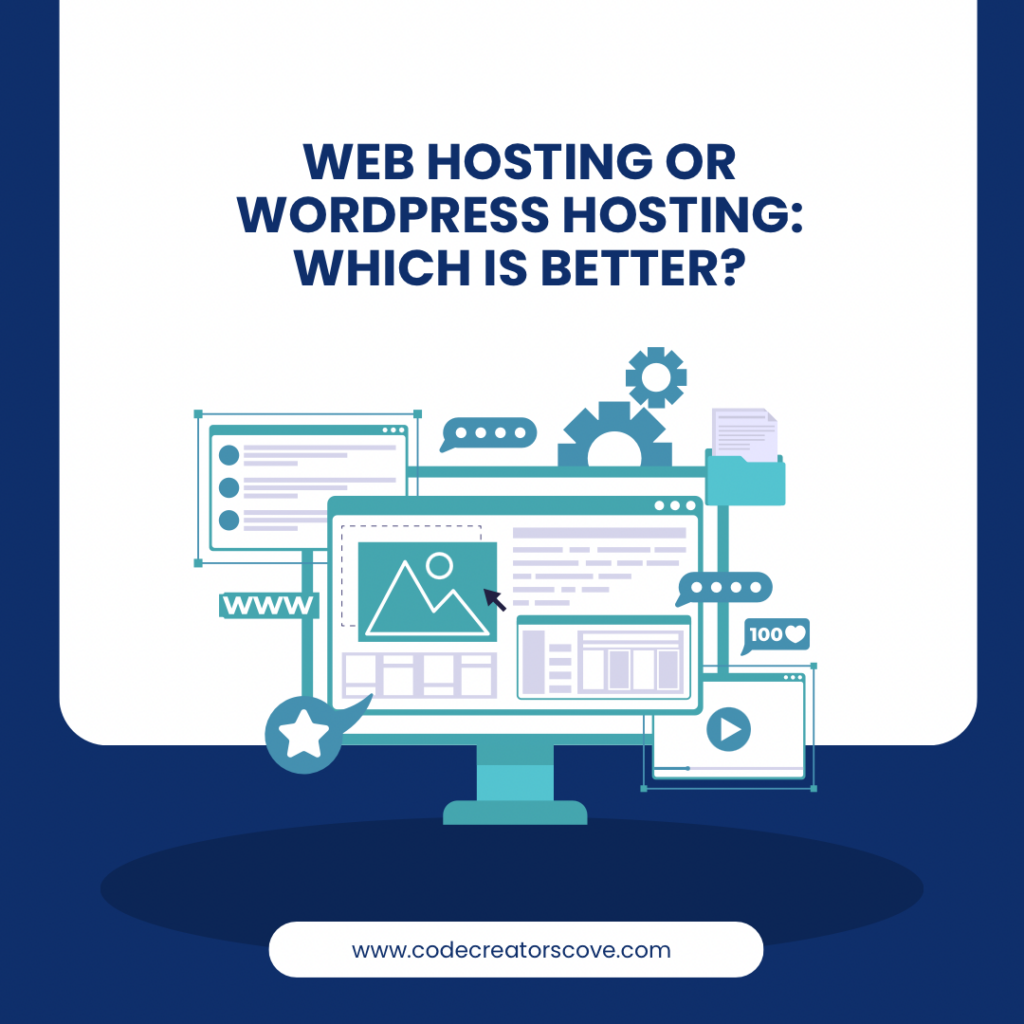Choosing the right platform for hosting your website is crucial in the digital realm. Various platforms provide distinct toolsets, and selecting the appropriate one could prevent potential headaches in the early stages of launching your business. This article outlines the main distinctions between web hosting and wordpress hosting, by examining the following;
- What is Web Hosting?
- What is WordPress Hosting?
- Benefits of Web Hosting and Drawbacks of Web Hosting
- Benefits of WordPress Hosting and Drawbacks of WordPress Hosting.
- Comparison of Shared Web Hosting and WordPress Hosting.
What is Web Hosting?
Web hosting encompasses a wide array of hosting packages, excluding WordPress. Numerous platforms offer hosting services, each providing various package options. Typically, the provider offers its own drag-and-drop website builder to facilitate site creation, and users often share server space with multiple other businesses.
Web hosting covers a range of hosting services like dedicated and shared hosting, cloud hosting, and VPS hosting.
The Benefits of Web Hosting
The following are the benefits of web hosting;
Affordability: Setting up a fully functional website and sales platform can cost just a few dollars per month.
Beginner-friendly: Many hosting platforms provide user-friendly website builders, eliminating the need for coding knowledge.
Platform Switching Ease: If you find a preferable package with a competitor, most hosting platforms offer free domain transfers and a straightforward setup process.
Integrated SEO Tools: Leading platforms include ready-made SEO packages to kick-start your business’s online visibility.
The Drawbacks of Web Hosting
The limitations of web hosting are listed below;
Limited customization: General web hosting offers fewer plugins and customization options compared to WordPress.
Impact of other websites on speed: Loading times may be prolonged depending on the activities of other sites sharing the server space.
Limited Customer Support: Customer care representatives of your web host must be generalists capable of handling various software and website types, resulting in the loss of specialized expertise typically found with WordPress-hosted websites.
What is WordPress Hosting?
WordPress hosting follows a similar model, but you share server space exclusively with other WordPress users, ensuring an environment optimized for peak performance with the world’s most popular content management system.
Essentially, it stands as a sub-category tailored to provide servers and resources optimized specifically for WordPress websites.
The Benefits of WordPress Hosting
It’s benefit are as follows;
Enhanced security: With nearly two decades of open-source experience, WordPress developers can promptly address specific threats aimed at the platform.
Expert Customer Support: Users opting for this hosting typically have access to a specialized team of knowledgeable experts, readily available to address common inquiries.
Extensive Global Community: From official blogs and forums to third-party articles and guides, finding answers to queries is readily accessible within the WordPress community.
The Drawbacks of WordPress Hosting
With benefits comes the drawbacks. They are;
Increased Technical Expertise Needed: Modifying your website often necessitates coding knowledge, especially for complex setups.
Possible Speed Challenges: WordPress sites require more resources than standard web hosting, potentially resulting in slower loading times.
Complicated Upgrades: Since all plugins are open source, upgrades may inadvertently affect other website features.
Expensive Add-ons: While WordPress itself is open source, plugin prices are determined by developers. Packing many features into your site can quickly escalate costs.
Which is Better?
If you intend to manage your website using WordPress, WordPress Hosting is the ideal choice. Unlike general hosting services, its plans are specifically optimized for WordPress sites. They provide the necessary server resources and often offer additional benefits such as staging environments and automatic updates.
For beginners or those with budget constraints, shared web hosting is the recommended choice. It’s beginner-friendly and allows for quick setup, making it ideal for small online stores or low-storage needs.
Individuals seeking more flexibility may prefer WordPress hosting. However, proficiency in coding may be necessary to fully utilize the platform, making it better suited for experienced entrepreneurs who are willing to invest time in managing the website’s backend.
Alternatively, for those who appreciate the benefits of WordPress but lack technical expertise, a managed service is available. Although more expensive, it provides access to a team of experts who handle security updates and performance issues.
Conclusion
Ultimately, there’s no definitive right or wrong choice. Features vary significantly across different web hosts, so it’s essential to explore various options to find the best fit for your business.


